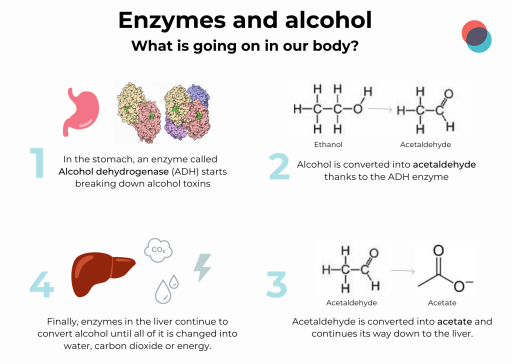Enzymes & Alcohol: How the body deals with alcohol consumption?
May 19th, 2022, by Labtoo's team
You may have had a few drinks and found yourself under the aftereffects of alcohol consumption, but what is really going on inside us?
Most mammals are not tolerant of alcohol molecules, which are processed as a toxin. But some mammals, such as the treeshrew or the human, have a higher tolerance when it comes to alcohol consumption. This could be explained by an evolutionary capacity to consume ripe fruits, that started to ferment, as a source of energy. With time and exposure to this diet, we developed a tolerance to alcohol molecules.

How does our body break down alcohol?
When ingesting alcohol, the first enzyme produced to help our body deal with the toxins is called Alcohol dehydrogenase (ADH). The process starts in the stomach, where ADH can detoxify about one drink per hour. The alcohol ingested is converted into acetaldehyde, which is even more toxic to the body, and is quickly converted to acetate so that it can be easily processed by our system. This enzyme process is also occurring in the liver until all the alcohol is changed into water, carbon dioxide, and energy.
Some people lacking or expressing less ADH, due to genetic mutations, are known to be more intolerant than the average. But anyone has alcohol intolerance at different levels. Some people also have an alcohol allergy, which causes an immune system response that can be restrained by not consuming alcohol.
What research is made on alcohol consumption?
Research on alcohol primarily focuses on addiction, alcohol consumption must always be taken seriously to avoid severe damage to health.
Some companies are working on solutions to limit the side effects of alcohol consumption such as hangovers. These companies stimulate alcohol by-product degradation through probiotics or enzymes, or by using different types of painkillers.
But as of now, and according to our knowledge, no miracle solution has been put on the market. So, drinking water is the best cure for now.
And remember, the best advice is to consume (good) alcohol in (high) moderation.